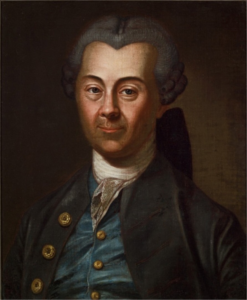To Chloe
(Poet's title: An Chloen)
Set by Schubert:
D 363
[probably June 1816]
Die Munterkeit ist meinen Wangen,
Den Augen Glut und Sprach entgangen;
Der Mund will kaum ein Lächeln wagen;
Kaum will der welke Leib sich tragen,
Der Blumen am Mittage gleicht,
Wann Flora lechzt und Zephyr weicht.
Doch merk ich, wann sich Chloe zeiget,
Dass mein entflammter Blick nicht schweiget,
Und Suada nach den Lippen flieget;
Ein glühend Rot im Antlitz sieget,
Und alles sich an mir verjüngt,
Wie Blumen, die der Tau durchdringt.
Ich seh auf sie mit bangem Sehnen,
Und kann den Blick nicht weggewöhnen:
Die Anmut, die im Auge wachet
Und um die jungen Wangen lachet,
Zieht meinen weggewichnen Blick
Mit güldnen Banden stets zurück.
Mein Blut strömt mit geschwindern Güssen,
Ich brenn, ich zittre, sie zu küssen;
Ich suche sie mit wilden Blicken,
Und Ungeduld will mich ersticken,
Indem ich immer sehnsuchtsvoll
Sie sehn und nicht umarmen soll.
There is no more liveliness in my cheeks,
It has gone from the glow in my eyes and my speech;
My mouth hardly dare form a smile;
My wilting body can barely carry itself,
It is like flowers in the middle of the day
When Flora is panting and Zephyr has stopped blowing.
But I notice when Chloe appears
That my inflamed gaze does not remain silent,
And Suada flows towards my lips,
A glowing red gains victory over my face,
And everything around me is rejuvenated,
Like flowers that are permeated by dew.
I look on her with anxious longing,
And I cannot avert my gaze:
The charm that keeps watch in her eyes
And which makes her young cheeks so cheerful
Always draws my averted gaze
Back to her using golden chains.
My blood flows in rapid torrents;
I am burning and trembling [because I want] to kiss her;
I search for her with a wild look in my eye
And impatience is about to suffocate me,
Since I am always full of longing
To see her but I may not embrace her.
All translations into English that appear on this website, unless otherwise stated, are by Malcolm Wren. You are free to use them on condition that you acknowledge Malcolm Wren as the translator and schubertsong.uk as the source. Unless otherwise stated, the comments and essays that appear after the texts and translations are by Malcolm Wren and are © Copyright.
☙
Themes and images in this text:
Arms and embracing Blood Chains and shackles Cheeks Dew Eyes Faces Flowers Gazes, glimpses and glances Gold Kissing Lips Longing and yearning Midday Mouths Red and purple Rejuvenation Smiling Wind
Although the poem is written ‘to’ Chloe, the writer is making an effort not to approach her or even to look in her direction. He is lifeless like a wilted flower when he is away from her, but as soon as she approaches he loses control of himself. His blushing and his gushing speech reveal what he knows he should repress. Yes, the wilted flower comes back to life (as if refreshed with dew) but there is still something that makes him avert his gaze, or rather, makes him feel that he should avert his gaze, since Chloe’s charms always draw his eyes to her (using some sort of ‘golden chain’).
We are not told why he should not gaze on her or why it is forbidden to embrace her. This is the sort of reticence that was usually encouraged of young women rather than men, so it may be that she is unattainable (she may be married or of the wrong social class). She might even not exist. Indeed there are features of the text which suggest that she is more of a symbol than a real woman. To begin with there is her name: Chloe. This is based on the Greek word for a young green shoot, and so the name came to be used to refer to the fertility goddess Demeter. The poet similarly embodies general abstract principles when speaking of Flora (a Roman goddess of flowers and spring), Zephyr (in Greek the personification of the west wind) and Suada (the Roman goddess of persuasion). We may well be dealing with a young lad simply in love with the idea (and torment) of being in love, rather than someone who is interested in the reality of a specific young woman. He might blush and gush when any girl shows up; he would not be the first or last to respond like that.
☙
Original Spelling An Chloen Die Munterkeit ist meinen Wangen, Den Augen Glut und Sprach entgangen; Der Mund will kaum ein Lächeln wagen; Kaum will der welke Leib sich tragen, Der Bluhmen am Mittage gleicht, Wann Flora lechzt und Zephyr weicht. Doch merk ich, wann sich Chloe zeiget, Daß mein entflammter Blick nicht schweiget, Und Suada nach den Lippen flieget; Ein glühend Roth im Antlitz sieget, Und alles sich an mir verjüngt, Wie Bluhmen, die der Thau durchdringt. Ich seh auf sie mit bangem Sehnen, Und kann den Blick nicht weggewöhnen: Die Anmuth, die im Auge wachet Und um die jungen Wangen lachet, Zieht meinen weggewichnen Blick Mit güldnen Banden stets zurück. Mein Blut strömt mit geschwindern Güssen; Ich brenn, ich zittre, sie zu küssen; Ich suche sie mit wilden Blicken, Und Ungeduld will mich ersticken, Indem ich immer sehnsuchtsvoll Sie sehn und nicht umarmen soll.
Confirmed by Peter Rastl with Schubert’s source, Sämmtliche Poetische Werke von I. P. Uz. I. Theil. Wien. Gedruckt für Franz Schrämbl bey Ignaz Alberti. 1790. [Sammlung der vorzüglichsten Werke deutscher Dichter und Prosaisten. IX. Band.] pages 14-15; with Sämtliche Poetische Werke von J. P. Uz. Erster Band. Leipzig in der Dykischen Buchhandlung. 1768, pages 17-18; and with Poetische Werke von Johann Peter Uz. Zweyter Band. Nach seinen eigenhändigen Verbesserungen herausgegeben von Christian Felix Weisse. Wien. Bey J. V. Degen, Buchdrucker und Buchhändler. 1805, pages 13-14.
To see an early edition of the text, go to page 14 [48 von 168] here: http://digital.onb.ac.at/OnbViewer/viewer.faces?doc=ABO_%2BZ165356104


